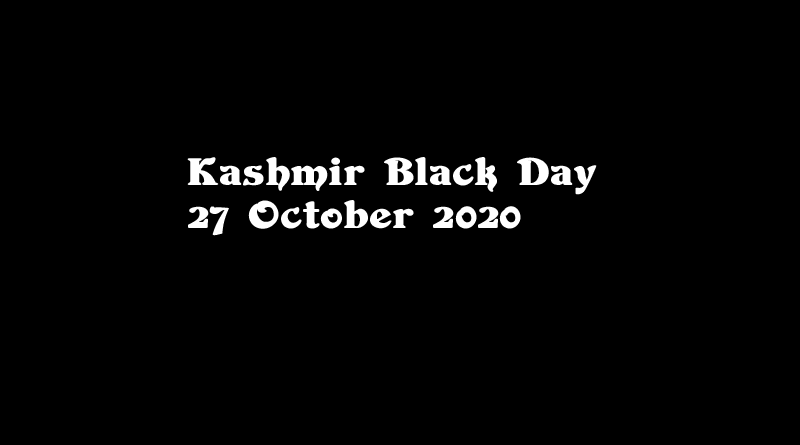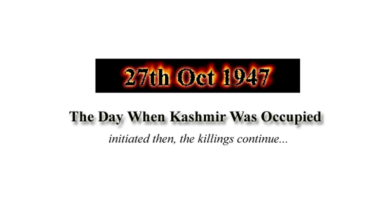October 27, a black day for Kashmiris
The people of Jammu and Kashmir have been resisting the Indian occupation for the last 70 years. They are involved in a freedom struggle, facing the worst kind of Indian state terrorism. They have braved the Indian subjugation and atrocities with great courage and New Delhi has failed to intimidate them into submission. On October 27, 1947, the sufferings of Kashmiri people started with the landing of Indian Army in Jammu and Kashmir. The day is, therefore, observed as a black day throughout the world wherever Kashmiris reside.
It is a fact that India, disregarding the Independence Act and Partition Plan in 1947, which stated that the Indian British Colony would be divided into two sovereign states, sent its troops in Jammu and Kashmir. India forcibly occupied the princely states of Hyderabad, Junagarh and Jammu and Kashmir, the first two being Hindu majority states with Muslim rulers while the Valley had majority Muslim population but was run by a Hindu ruler. The Indian government and the Maharaja Hari Singh claimed to have an Instrument of Accession but many world historians reject the existence of any such document with the argument that if it existed, the Indian government would have made it public, either officially or at any international forum. This never happened.
Unfortunately, the Boundary Commission, headed by British Barrister Cyril Radcliff, also helped India in occupying Kashmir Valley. He split Gurdaspur, a Muslim majority area, and handed it over to India, thus making a demarcation that allowed a land route to Jammu and Kashmir. Following the arrival of Indian forces, a massacre of Muslims ensued so as to change the demographic status of the Valley. The people of Kashmir never accepted the illegal occupation and started a freedom struggle supported by a public uprising in 1947. Meanwhile, the Indian government approached the UN Security Council on January 1, 1948, seeking its help to settle the dispute over Kashmir. The Security Council passed two resolutions approving a ceasefire, demarcation of the ceasefire line, demilitarization of the state and a free and impartial plebiscite to be conducted under the supervision of the United Nations. These resolutions were passed on August 13, 1948, and January 5, 1949, which were accepted both by Pakistan and India. Only one phase of these resolutions (ceasefire and demarcation of ceasefire line) was implemented while demilitarization of the occupied territory and holding of a plebiscite still remain unimplemented.
The festering problem has led to barbaric killings of thousands of people in the valley, including women and children, by the Indian armed forces. Since January 1989 till today 2020, Indian troops have martyred 95,686 Kashmiris, widowed 22,920 women, orphaned 107,802 children and molested or gang-raped 11,219 Kashmiri women; the rape of women being used as a weapon of war to intimidate the Kashmiris into submission. Over 8,000 innocent youth have been subjected to disappearance in custody and their whereabouts remain untraced. Many of those are feared to be buried in thousands of unmarked graves discovered in the territory after being killed by the Indian troops in fake encounters. More than 340 youths have lost their one or both eyes to pellet injuries while over 1,020 are on the verge of losing their eyesight. Hundreds of people including Hurriyat leaders have been put behind the bars.
Another date in October is important for Kashmiris i.e. on October 22, 1947, Pashtuns and Kashmiri volunteers started to advance to liberate the land. Maharaja Hari Singh got unnerved and fled the area asking for Indian help. India immediately launched forces which landed in Srinagar on 26 Oct 1947. The Maharaja signed Instrument of Accession later. The advance by Kashmiri and Pashtun tribal leaders resulted in partial success as Indian forces had already reached Srinagar. The liberated area was renamed as Azad Jammu and Kashmir.
Since 5 Aug 2019, India has converted IIOJK into the largest human cage of the world in violation of all existing HR treaties and bindings. A mass genocide and change in demography is taking place. Political leadership of IIOJK is in detention or house arrest and is being forcibly sidelined. As Pakistan continues to stand with Kashmiris in their fight for right of self-determination, October 22 remains the day when Kashmiri people stood up for their rights in 1947 and shall never surrender to unjust and brutal regime of India. As global players continue to ignore the resolution of the dispute, it has become a humanitarian issue in the region. The issue remains an international dispute. However, because of its very weak case on the disputed valley, India terms it a bilateral dispute and avoids internationalizing the issue. The UN High Commissioner for Human Rights Zeid Ra’ad Al Hussein last year said in a report on held Kashmir: “The political dimensions of the dispute between India and Pakistan have long been centre-stage, but this is not a conflict frozen in time. It is a conflict that has robbed millions of their basic human rights, and continues to this day to inflict untold suffering,” said “This is why any resolution of the political situation in Kashmir must entail a commitment to end the cycles of violence and ensure accountability for past and current violations and abuses by all parties, and provide redress for victims.” India has exhausted all its resources but it has failed to suppress the liberation sentiment of the Kashmiri people. Is any world power listening?
Courtesy:
https://www.thenews.com.pk/print/735009-october-27-a-black-day-for-kashmiris


